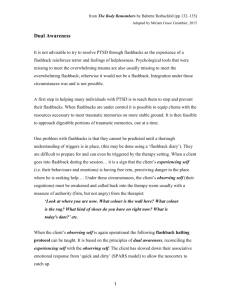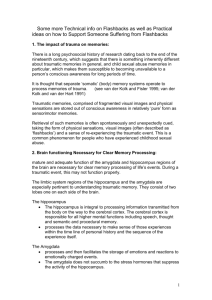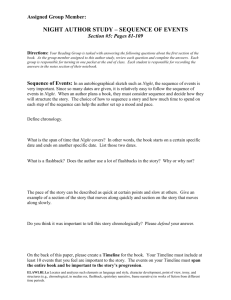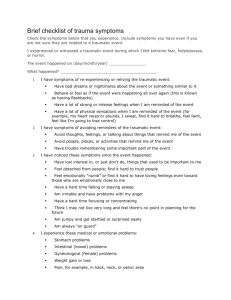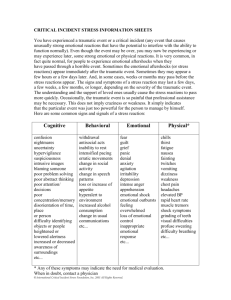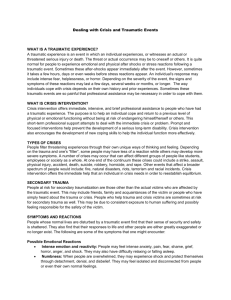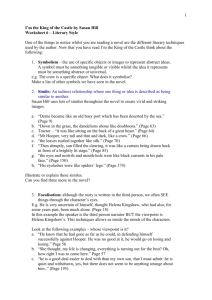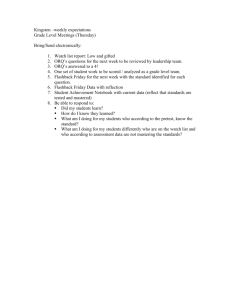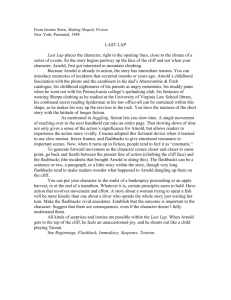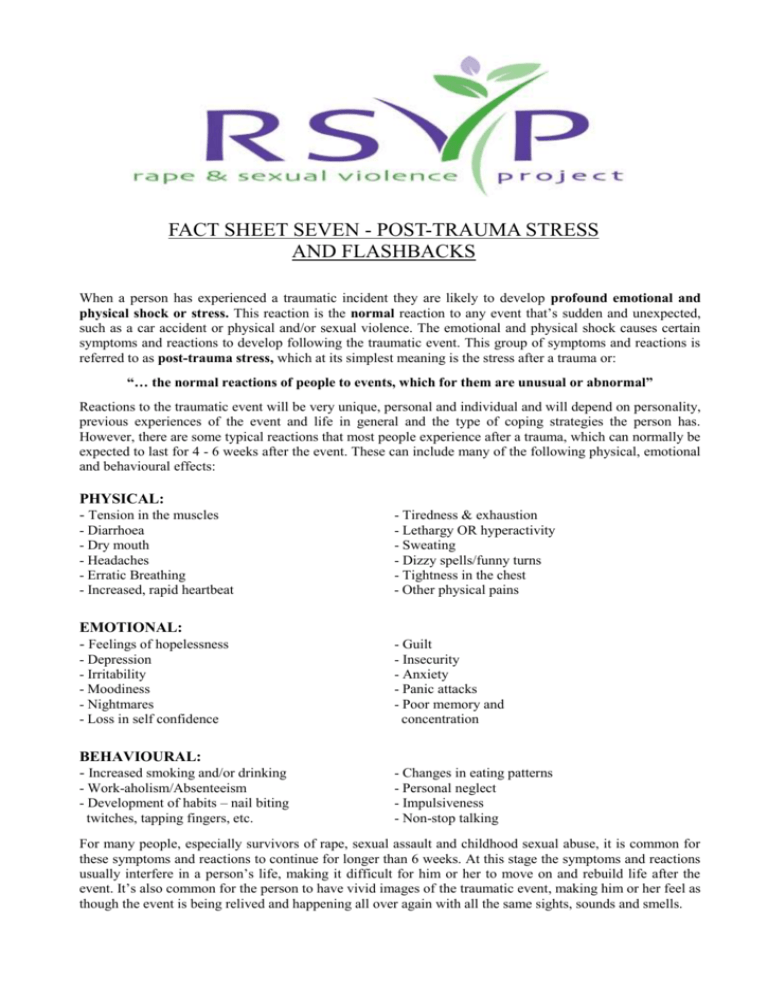
FACT SHEET SEVEN - POST-TRAUMA STRESS
AND FLASHBACKS
When a person has experienced a traumatic incident they are likely to develop profound emotional and
physical shock or stress. This reaction is the normal reaction to any event that’s sudden and unexpected,
such as a car accident or physical and/or sexual violence. The emotional and physical shock causes certain
symptoms and reactions to develop following the traumatic event. This group of symptoms and reactions is
referred to as post-trauma stress, which at its simplest meaning is the stress after a trauma or:
“… the normal reactions of people to events, which for them are unusual or abnormal”
Reactions to the traumatic event will be very unique, personal and individual and will depend on personality,
previous experiences of the event and life in general and the type of coping strategies the person has.
However, there are some typical reactions that most people experience after a trauma, which can normally be
expected to last for 4 - 6 weeks after the event. These can include many of the following physical, emotional
and behavioural effects:
PHYSICAL:
- Tension in the muscles
- Diarrhoea
- Dry mouth
- Headaches
- Erratic Breathing
- Increased, rapid heartbeat
EMOTIONAL:
- Feelings of hopelessness
- Depression
- Irritability
- Moodiness
- Nightmares
- Loss in self confidence
BEHAVIOURAL:
- Increased smoking and/or drinking
- Work-aholism/Absenteeism
- Development of habits – nail biting
twitches, tapping fingers, etc.
- Tiredness & exhaustion
- Lethargy OR hyperactivity
- Sweating
- Dizzy spells/funny turns
- Tightness in the chest
- Other physical pains
- Guilt
- Insecurity
- Anxiety
- Panic attacks
- Poor memory and
concentration
- Changes in eating patterns
- Personal neglect
- Impulsiveness
- Non-stop talking
For many people, especially survivors of rape, sexual assault and childhood sexual abuse, it is common for
these symptoms and reactions to continue for longer than 6 weeks. At this stage the symptoms and reactions
usually interfere in a person’s life, making it difficult for him or her to move on and rebuild life after the
event. It’s also common for the person to have vivid images of the traumatic event, making him or her feel as
though the event is being relived and happening all over again with all the same sights, sounds and smells.
These vivid images are known as flashbacks and are real and active memories of a past traumatic event.
These flashbacks can arrive at any time, be out of a person’s control and once they arrive are difficult to get
rid of. They can also trigger some of the same emotional, physical and behavioural reactions that the person
had when the original traumatic event happened, so a person can re-experience many of the symptoms
described above. They can therefore be very powerful and frightening experiences creating panic, a sense of
being out of control and confusion.
To survive something traumatic a person usually has to protect him or herself from the full emotional and
physical horror of the event. Therefore, physical feelings, emotions and thoughts become shut off,
unexpressed and locked in a time capsule. Once the traumatic event is over the body and brain signals that
it’s ready to deal with these unexpressed physical feelings, emotions and thoughts by producing flashbacks.
The full emotional and physical horror of the event appears time and time again in a flashback until the
original shut off emotions and thoughts are expressed and dealt with. So although flashbacks can be
confusing and terrifying they frequently signal a readiness to deal with traumatic and abusive experiences in
a more conscious and controlled way.
If You Are Supporting Someone Who Has Flashbacks:
1.
LEARN ABOUT POST-TRAUMA STRESS AND FLASHBACKS: If you increase your own knowledge
about post-trauma stress and flashbacks you can pass this knowledge onto the person you are supporting.
Flashbacks are very frightening both for those experiencing them and for the people around, so information
can be important in helping to deal with this fear. Also, learning about what might trigger the flashback for
the person you are supporting could be vital information and help them to avoid this trigger in the future.
2.
HELP THE PERSON TO GAIN SOME CONTROL: A person’s life can feel out of control as flashbacks
usually happen suddenly, without little warning. Help the person to develop an action plan for dealing with
flashbacks, both during and after. This will give the person back a sense of control over his or her life.
3.
KEEP CALM DURING A FLASHBACK: It is important that you remain calm if the person has a
flashback whilst you are with them. Take deep breaths, concentrate on relaxing and don’t panic as this will
only make the situation worse. Make sure that the person is not in danger and stay with the person until he or
she has come back to the present time.
4.
SEEK SUPPORT YOURSELF: Coping with your own feelings and needs will ensure that you become a
better support for the person who is experiencing the flashbacks.
________________________________________
If You Have Flashbacks Help Yourself in The Following Ways:
1.
TELL YOURSELF THAT YOU ARE HAVING A FLASHBACK: Learn to recognise what happens to
your body when you are having a flashback and to recognise the clues your body gives you just before a
flashback happens.
2.
REMIND YOURSELF THAT THE WORST IS OVER: The feelings and sensations you are
experiencing now are memories of the past. The actual event took place a long time ago and you survived it,
respect the fact that you did survive the experience.
3.
GET GROUNDED AND FOCUS ON THE PRESENT: Use your senses to keep you focused on the
present. Look around and see the different colours, things and people around you. Listen to the different
sounds - music, people or your own breathing. Feel your body and what is touching it: your clothes, the chair
or the floor supporting you. Stamp your feet on the ground if you have to, so that you know where you are
and that you are no longer trapped in a situation you cannot escape from. Drink or eat something and focus
on the taste and smell of the food or drink.
4.
BREATHE: When you get scared it is likely that you begin shallow breathing or stop breathing altogether.
As a result your body could react to the lack of oxygen, causing panic feelings, pounding in the head,
tightness, sweating, faintness and dizziness. If you breathe deeply some of this panic will decrease. Breathing
deeply means putting your hand on your stomach and breathing in so that your stomach pushes against your
hand and then breathing out so that the stomach goes in.
5.
GET IN TOUCH WITH YOUR NEED FOR BOUNDARIES: Sometimes when we are having a
flashback we lose the sense of where we finish and where the world begins: as if we do not have skin. Wrap
yourself in a blanket, hold a pillow or go to bed; do anything to help you to feel protected.
6.
TELL YOUR FRIENDS, PARTNER OR RELATIVES ABOUT FLASHBACKS: It’s important that the
people around you know about flashbacks so that they know how to help you. You may want someone to be
with you during or just after a flashback, or you may prefer to be alone, decide what you find most helpful
and let others know.
7.
TAKE TIME TO RECOVER: Flashbacks are very powerful so give yourself time to make the transition
from this powerful experience. Don’t expect yourself to jump into activities right away. Take a nap, have a
warm bath or take some quiet time. Show yourself kindness, gentleness and patience, it takes time to heal the
past and everyone heals in his or her own way and time.
8.
APPRECIATE YOURSELF: You have survived a traumatic, abusive experience and as you continue to
cope with the after effects of rape, sexual assault or childhood sexual abuse it’s important that you treat
yourself with care:
Think kind, loving thoughts about yourself and write down all the things that you like about yourself
(affirmations).
Do things that you like to do (dancing, singing, gardening-anything that you enjoy!)
Create good feelings by listening to your favourite music, cooking a favourite meal, wearing your favourite
clothes-anything that makes you feel good.
9.
FIND SOMEONE TO SUPPORT YOU: Anyone who understands the effects of rape, sexual assault and
childhood sexual abuse can be a valuable support in the healing process. You do not have to cope alone; it
can be healing to share your experience with others and to know that someone cares. Call the Rape and
Sexual Violence Project Helpline on 0121 233 3818 or call our other numbers (see below).
It is usual to have a range of different feelings, which could change from day to day. Talking to someone, in
confidence, could help you make sense of things. A RSVP staff member or helpline volunteer will listen and
explore your feelings with you. You might feel nervous calling the helpline to ask for support; it takes
courage to call. A volunteer will appreciate this and treat you with respect and sensitivity. All helpline
volunteers are specially trained to speak to anyone affected by rape, sexual assault or childhood sexual
abuse; they can offer support, information and a listening ear. The helpline has an answer-phone that tells
you when we are open. If you call when the helpline is closed you can leave a name and a safe contact
number and a volunteer will call you back.
10.
FINALLY, KNOW YOU ARE NOT CRAZY…YOU ARE HEALING AND DEALING
WITH THE NORMAL REACTIONS TO A TRAUMATIC EVENT.
RSVP: 0121 236 5763 OR 0121 200 1695
Leaflets, handouts, exercises and posters
This factsheet may be photocopied under the following conditions:
1.
2.
3.
Each page must be copied in its entirety, including RSVP information headings, where applicable.
Copies may be made for use within organisations for training purposes or for clients/individuals for self
help purposes.
Copies may not be resold.

